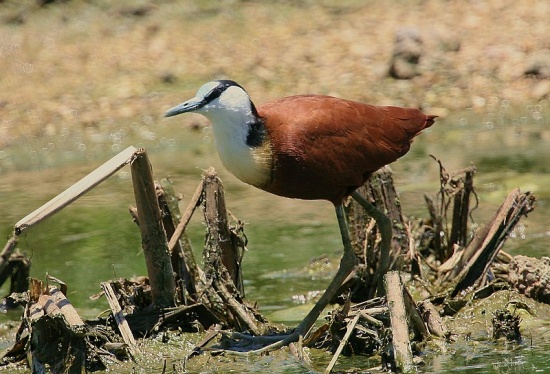JohnN-1520 (talk | contribs) |
|||
| Line 1: | Line 1: | ||
;Actophilornis africanus | ;Actophilornis africanus | ||
| − | [[Image:African_Jacana.jpg|thumb|550px|right|Photo by IvoZafirov]] | + | [[Image:African_Jacana.jpg|thumb|550px|right|Photo by IvoZafirov<br>Photographed: Lake Victoria, Uganda]] |
| − | |||
| − | The | + | ==Identification== |
| + | These are conspicuous and unmistakable birds. They are 30cm long, but the females are larger than the males. They have chestnut upperparts with black wingtips, rear neck and eyestripe. The underparts are white, with a chestnut belly patch in adult birds. The blue bill extends up as a coot-like head shield, and the legs and very long toes are grey. | ||
| + | ==Distribution== | ||
| + | They are found worldwide within the tropical zone. | ||
| + | ==Taxonomy== | ||
| + | ==Habitat== | ||
| + | ==Behaviour== | ||
| + | The African Jacana (Actophilornis africana) is a jacana. The jacanas are a group of waders in the family Charadriidae, which are identifiable by their huge feet and claws which enable them to walk on floating vegetation in the shallow lakes that are their preferred habitat. | ||
African Jacana breeds throughout sub-Saharan Africa. It is sedentary apart from seasonal dispersion. It lays four black-marked brown eggs in a floating nest. The males, as in some other wader families like the phalaropes, take responsibility for incubation. | African Jacana breeds throughout sub-Saharan Africa. It is sedentary apart from seasonal dispersion. It lays four black-marked brown eggs in a floating nest. The males, as in some other wader families like the phalaropes, take responsibility for incubation. | ||
| − | + | The African Jacana's food is insects and other invertebrates picked from the floating vegetation or the water’s surface | |
| − | |||
| − | |||
| − | |||
==External Links== | ==External Links== | ||
{{GSearch|Actophilornis+africanus}} | {{GSearch|Actophilornis+africanus}} | ||
[[Category:Birds]] | [[Category:Birds]] | ||
Revision as of 21:39, 24 December 2007
- Actophilornis africanus
Identification
These are conspicuous and unmistakable birds. They are 30cm long, but the females are larger than the males. They have chestnut upperparts with black wingtips, rear neck and eyestripe. The underparts are white, with a chestnut belly patch in adult birds. The blue bill extends up as a coot-like head shield, and the legs and very long toes are grey.
Distribution
They are found worldwide within the tropical zone.
Taxonomy
Habitat
Behaviour
The African Jacana (Actophilornis africana) is a jacana. The jacanas are a group of waders in the family Charadriidae, which are identifiable by their huge feet and claws which enable them to walk on floating vegetation in the shallow lakes that are their preferred habitat. African Jacana breeds throughout sub-Saharan Africa. It is sedentary apart from seasonal dispersion. It lays four black-marked brown eggs in a floating nest. The males, as in some other wader families like the phalaropes, take responsibility for incubation.
The African Jacana's food is insects and other invertebrates picked from the floating vegetation or the water’s surface




